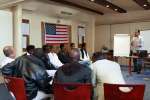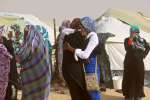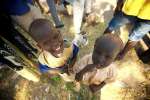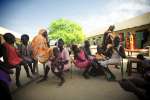- Text size
 |
|  |
|  |
| 
- Français
For a refugee family in Spain, a new life presents new challenges
News Stories, 25 July 2013
MADRID, Spain, July 25 (UNHCR) – Ibrahim and his family were not pleased when they were told to move out of the Madrid reception centre that had been their home for a year and into a rental apartment of their own.
Most people would have been delighted to receive such an offer, but 52-year-old, his wife Awatif and their three children were refugees from Sudan. Relative strangers in a foreign land, they were still struggling to find their feet after being resettled to Spain from a hot, dusty camp in Tunisia a year ago.
"At first, they resisted leaving the centre because, without friends or relatives in Spain, we were their only contact," noted Santiago García, who runs the Vallecas reception centre in Madrid.
In the centre the family was helped to obtain health cards and international protection documents; were able to take Spanish language lessons; received psychosocial support and their children were enrolled for school.
It was an important part of their life, but UNHCR, local NGOs and the Spanish government share the goal of helping resettled refugees to become independent as soon as possible. Moving into an apartment they can call home, is a vital step in the integration process.
"It is good for them to face reality and to be able to manage their lives on the modest financial support they will receive for some months," said García. The family will face many challenges as they integrate into Spanish society, he said, adding that the couple's children, aged from nine to 13 years, are likely to adapt more quickly than their parents.
Ibrahim was born in Sudan's South Kordofan province, which became the southern border of the country once South Sudan gained its independence in 2011. The oil-rich province was rocked by fighting during the north-south war and again in recent internal clashes that forced tens of thousands to flee to South Sudan.
Ibrahim said he was persecuted in the 1990s, when he was living in the Sudanese capital Khartoum, after he accused the government of neglecting parts of the country. He says that because of this perceived anti-government criticism he was detained and imprisoned where, on several occasions, he was tortured.
In 1995, he fled to Libya, where he had relatives. He travelled by road through Darfur and Chad on an arduous journey that took several weeks. In the city of Benghazi, he met and married Awatif, also from Sudan, and they went on to have two boys and a girl.
Ibrahim worked in a variety of jobs, including as a labourer, accountant, construction worker, and hotel clerk. Life in Libya was difficult for people from sub-Saharan Africa, especially after the anti-government uprising began in February 2011, when they were seen by many as supporters of the former leader, Muammar Gaddafi.
The family eventually escaped to Tunisia, where they spent months in the Choucha refugee camp which provided temporary shelter for tens of thousands of people fleeing Libya. Last July, they flew to Spain as part of a group of 80 refugees in Choucha who were accepted for resettlement on the recommendation of UNHCR.
Ibrahim says he feels safe and comfortable in Madrid, but that he needs more time to shake off the past. "I know that the language is the most important thing now, but I just cannot concentrate. The memories are always buzzing in my head," he said in English.
He's happy his family are in their own apartment, not far from the reception centre, and proud of his children, who speak fluent Spanish and are settling in well at school and making friends. Ibrahim and his wife, meanwhile, continue to look for work at a time when many people in Spain are suffering the effects of the country's financial crisis.
Having confronted life-threatening challenges in the past, Ibrahim says he is determined to make the most of the opportunity given to him by Spain and UNHCR. "If we were able to survive so far, I should be able to offer my children a better future," he said.
By María Jesús Vega in Madrid























































